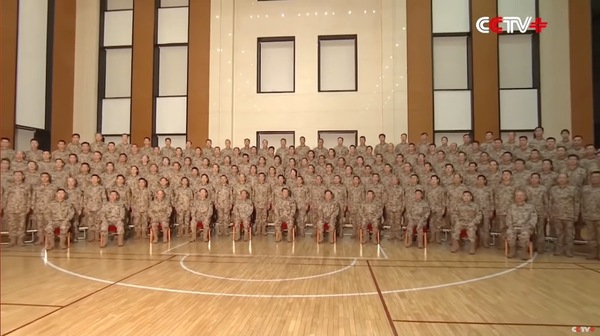
–>
December 31, 2022
It is folly to believe that the US should engage in a repeat of the Cold War with the rising world power that is China, reflecting the maxim that “Generals always fight the last war.” That implies that the current military strategy focuses too much on what happened before rather than what will happen next. Rather than repeating the Cold War, the US should rethink how it views its place in the world and work to partner with China on high-priority issues that affect both countries, like nuclear weapons, trade policies, natural resources, economics, etc. This necessarily requires that the US and China negotiate and live up to expected behaviors and policies as well as partnering in combating global threats that both countries face.
‘); googletag.cmd.push(function () { googletag.display(‘div-gpt-ad-1609268089992-0’); }); }
The US-Soviet Cold War involved two world powers of relatively equal military might who also had significant access to natural resources and technology, although the US enjoyed a significant lead on the technology side. The key to the US success in the Cold War was that the US economy was far stronger than the Soviet economy due to the Soviets’ fundamentally flawed central economic management. In the end, the US could outspend the USSR in everything from technology and military to supporting allies with various forms of foreign aid—including sending shiploads of wheat to the Soviets.
Most significantly, after WW2, US forces occupied key war-torn nations in Europe and Asia and were driven to adopt robust western forms of political and economic organization. Soviet dominance over Eastern European countries after WW2, all of which followed communist doctrines, did not result in similarly growing and powerful economies. Governments dominated by the Soviets were also far from desirable.
The challenge with China is very different. The West did not defeat China in a devastating war and then occupy it for 50 years while driving western governance and economic practices to change fundamentally how the nations functioned. China, under Mao and subsequent communist leaders, did that to itself at great cost.

Image: Xi Jinping inspects the troops. YouTube screen grab.
‘); googletag.cmd.push(function () { googletag.display(‘div-gpt-ad-1609270365559-0’); }); }
Nor is the Chinese economy as vulnerable as the Soviet economy was. Today, the two greatest economies on the planet are the US and China, with China’s having grown at some 6.5% in the last decades, while the US and European economies struggled at around 2%.
Despite the moderate decrease in growth due to the COVID pandemic, if China’s economy grows at anything close to what it has been, its economy could be much larger than ours by mid-century. This implies that China will be able to outspend the US on everything, most especially on anything that counters the West’s efforts at maintaining a new Cold War or influencing allies and other nations around the globe.
Please note, though, that there is reasonable debate about how robust the Chinese economy actually is and even about the actual population numbers as a result of the one-child policy. Many things can happen between now and 2050, but the estimates are still reasonably close, and it would be foolish to assume they are not—or could not be the case soon. To read more on some alternative perspectives on China’s future, I suggest Red Flags: Why Xi’s China is in Jeopardy by George Magnus et al.
China has sent some 800,000 students abroad for university education, which has contributed to a growing class of well-educated, entrepreneurial, and wealthy Chinese. Even Xi Jinping, the undisputed ruler of China, sent his own daughter to Harvard, where she graduated in 2014. China is engaged in all manner of educating its elites, obtaining and researching modern technology, and taking advantage of its economic power to become a world power in every sense.
Furthermore, China is now aggressively engaging foreign nations outside of its traditional sphere of influence. And of course, China is still operating a huge espionage effort in both the military and corporate arenas and has been recalcitrant in observing international patent and copyright laws. However, a Cold War with China will not address any of this.
Despite all this relatively new interaction with the outside world, and because of its strength and the strength it has yet to develop, China will not become a western-style capitalist country. It will forge its own path as a global power for the foreseeable future, and current attempts to isolate and/or militarily influence China will have very limited success in the near term—and even less impact over time.
‘); googletag.cmd.push(function () { googletag.display(‘div-gpt-ad-1609268078422-0’); }); } if (publir_show_ads) { document.write(“
With more than three times America’s population and an economy that could significantly surpass ours, we must rethink our position as a global power and how we can interact at the global level with another successful superpower.
A militaristic Cold War approach will likely lead to a confrontation that could easily spin out of control, creating a devastating global hot war that destroys both countries. This is not to say that we should not use the military to counter Chinese military provocations; only that these types of confrontations can and do get out of hand.
All this means that the US must rethink its global strategy. Rather than a fruitless containment policy, we must negotiate mutually beneficial policies on everything from nuclear weapons to copyrights and patents.
For example, we might consider recognizing some Chinese territorial claims and negotiating tolerable freedom of navigation policies. We could work toward a hands-off policy for Taiwan—even a temporary one—and engage China in denuclearizing North Korea.
According to Sascha Glaeser at Defense Priorities,
The status quo is recognition that there is one China—Taiwan does not seek de-jure independence and China does not seek unification through force. Taiwan should therefore carefully consider the risks of pursuing policies that jeopardize or abandon the status quo, which has helped maintain cross-strait peace for decades.
There is room for negotiation still.
Both the West and China have high-priority needs that can be diplomatically managed. We can no longer be vague in our policies with China. Instead, we must recognize that China is a growing global power and establish clear and enforceable agreements on how we will interact.
In his book, Destined For War, Graham Allison, who believes war can be avoided, points out that it is imperative that the US (and the West) identify our global priorities. We cannot respond to every possible threat. We must do some hard and even distasteful analyses of our objectives.
Are the American people really willing to fight over Taiwan or freedom of navigation issues near Chinese-claimed islands? What are we truly willing to fight for? Likely, very few issues are worth sending our children to war.
We must identify these issues and then negotiate appropriately. In addition, we must coordinate our strategies across all the areas in which we interact with China. The military cannot plan for war while our economic interactions run independently of the strategy as they do today, and our diplomatic interactions rely on vague and uncertain national objectives.
Finally, the US should improve its military readiness while at the same time negotiating with China in the manner we did with the Soviet Union (talks that resulted in the SALT , START, and other treaties that helped reduce tensions and the likelihood of war). We cannot appease China, but we cannot simply plan on a Cold War to avoid WW3. Competing global powers do not have to go to war, but to avoid that, the US and the West must radically rethink our global needs and how we engage with China.
<!– if(page_width_onload <= 479) { document.write("
“); googletag.cmd.push(function() { googletag.display(‘div-gpt-ad-1345489840937-4’); }); } –> If you experience technical problems, please write to [email protected]
FOLLOW US ON
<!–
–>
<!– _qoptions={ qacct:”p-9bKF-NgTuSFM6″ }; ![]() –> <!—-> <!– var addthis_share = { email_template: “new_template” } –>
–> <!—-> <!– var addthis_share = { email_template: “new_template” } –>






